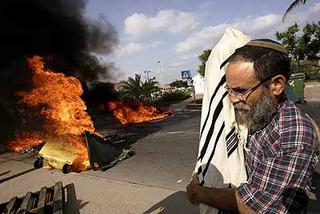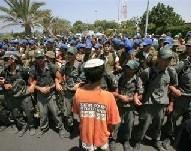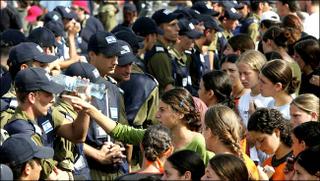
First I'd like to clarify that I do mean Front in the sense of War Front. This is a psychological, spiritual and emotional war of the highest degree, besides being the largest military operation in Israeli history. It is correct that there has not been physical murder, and the brutal beatings have been kept to a minimum. Nonetheless, no one should have any illusions that this is nothing less than a battle for the spiritual, religious and political future of the People of Israel. Sharon has employed the entire security apparatus to this end. He is also supported by the courts, the media, the international community, and most painfully by Moetzet Yesha. Others are elaborating elsewhere regarding the duplicitous betrayal by Moetzet Yesha leaders.
I'll just mention two examples that I came across personally. I'm sure other incidents will come to light with time. Moetzet Yesha sabotaged the home-grown volunteer effort that was running smoothly in Nvei Dekalim until they bullied their way in and that let the organization collapse and eroded the morale and resistance. Secondly, they were directly responsible for handing over the gate of Nvei Dekalim to the army, accelerating their entry to the Yishuv.
The Disengament so far has been one of the most impressive military and logistical excercises conducted to-date. No expense has been spared to make sure the operation goes smoothly. In the sweltering heat, soldiers have been provided with the additional equipment of blue mesh vests bearing the Israeli flag and emblem in a cynical use of these symbols. Members of the press have been issued pretty red caps so that they wont be confused with settlers. Every free bus and truck in the country has been commissioned to help with the transfer. The army created a portable roving tire repair shop to insure that Jews and their possesions are transported with minimum delay.
The actual tactics for forcefully removing people from their homes was chillingly effective. A bus pulls up to the entrance of a home. 40-50 soldiers form a perimeter around the bus and the house ensuring no one can get in or out. Slowly, patiently, methodically -- even caringly and gently they escort the residents out. By now, most people have seen images of the screaming, crying resistance or quiet resignation.
Someone once told me that the only difference between the Nazis and all others that tried to kill Jews before the Holocaust, was that the Nazis were efficient.
Well, now we've come across an even more capable and efficient people. The Israeli government has showcased these brilliant population removal techniques to the security forces of the world. Now they know how to deport docile Jews worldwide.
First you start with a demonizing campaign. Next you pass appropriate legislation. An authority is established to help the target population with their transfer and create carrot-and-stick laws to encourage and/or frighten the people to move.
What is really impressive is the operational side. Troops are provided with detailed and marked satellite maps of the community. Airborne drones conduct 24-hour reconnaissance and via infra-red probably know exactly how many bodies are in each house, of what size, and whether they are sleeping or not.
Advance troops arrive to offer "help" to families that might be interested in moving. Among these troops they confirm who is a long-time resident, who is cooperating with the authorities and who is resisting, and formulate the order of evacuation. More troops come in quietly and unobtrusively and hang out, silently building up their forces in the area.
The psychological aspect has also been well thought out. There is constant misinformation from multiple sources, including media, government, police and army. An environment of uncertainty and fear is established. The uninvited moving containers was an excellent example of developing the sense of defeat.
The most important part in this sort of battle is neutralizing the leadership. This in my opinion was the masterstroke of the whole operation and the reason for Sharon's confidence. At some point he got Moetzet Yesha in his pocket. I'm not sure what their motivation was, though I have my suspicions. The bottom line is that Moetzet Yesha put on a great Public Relations show, but that was about it. They torpedoed every single tactical move that could have made a real difference. They were also able to get most of the Rabbinic leadership to tow the line with them.
The use of force was also well balanced. The army showed masterful restraint and patience, but then after a certain amount of time attacked quickly, brutally and without remorse. This neutralized the more agressive resistance and put bodily fear into the rest.
The logistical support was examplary and impressive. On my way out of Nvei Dekalim, I was transported to the new and expanded Reim Army Base. It is a city. I thought I had been taken to an airport. There were multiple traffic coordinators sending empty trucks, full trucks, empty buses, full buses, troops and transports to their correct destination in an extremely professional and efficient fashion.
All in all the Israeli security forces get high marks for their execution of this exemplary case of ethnic cleansing.
On a better note, after we've been informed that most of the Yishuvim have been Jew-cleaned, I just spoke with Marc Zell of Alon Shvut. He is in Gadid -- and it is packed. There are hundreds of people still there. It seems refugees from other Yishuvim as well as a number of original families are still holding on. People have still been streaming in.
It is not clear what the future holds, especially now that it has been painfully clarified that we live in a state that bears a remarkable resemblance to the Nazi regime in its early years.
We lost this battle the day that massive numbers of troops were willing to forcefully remove their brothers from their homes. The reason for this social failure deserves deep and serious analysis and contemplation. There is a real divide in Israeli society if thousands of young men and women are able to man-handle women and children despite their begging and pleading.
Just like in Germany where there were Germans and German Jews, we are seeing a phenomena in Israel of Israelis and Israeli Jews. Shimon Peres was probably the first to verbalize this distinction when he lost the election to Bibi and stated that the Jews had won and the Israelis had lost.
What are the implications of a growing divide? What are the hopes of reuniting with people so far removed from a Jewish identity? What should our attitude to the State, the Army, and the institutions we used to venerate be? I know I will never look at someone in uniform the same way again. I had two experiences with security forces after my departure from Nvei Dekalim. This first was my going on an army transport filled with troops that had just assisted in the cleansing of Morag. They were embarrassed, caring, helpful and even sad upon seeing me. The conflict of emotions was difficult and I broke into silent tears. The second experience was when I walked by a group of policemen at a gas station outside of the expanded closed military zone in the south. My eyes locked with one of them and there was one message in his contact: "Enemy".
Many have said that this is not the end, but the beginning. The beginning of what? I think it will be the beginning of greater persecution and Jew-cleansing. It will be the beginning of more terror and loss of life. It will be the beginning of more discrimination of religious Jews by those in power.
However, it also needs to be the beginning of community soul-searching. Where did we go so wrong that such a divide and estrangement could develop? What do we need to do to correct it? Why has our leadership failed us so miserably? What should our relationship be to this unholy State and its destructive and hateful institutions? How do we take these lessons and use it in a constructive, responsible and intelligent fashion? What is our hope for the future and how do we get there?
I don't have answers.
I don't even know who to ask.




